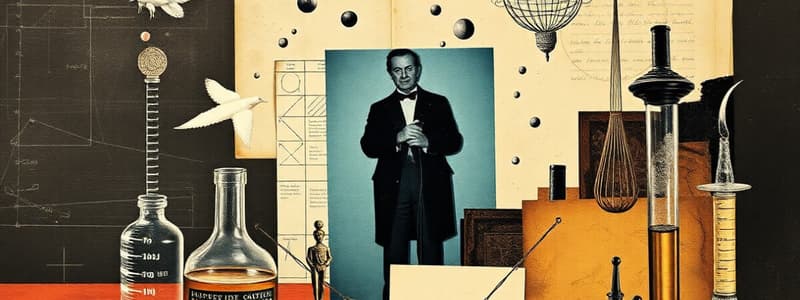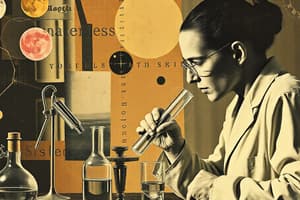Podcast
Questions and Answers
A researcher aims to study the effects of a new drug on patients with hypertension but unintentionally introduces personal beliefs into data interpretation. Which core principle of science is most directly violated?
A researcher aims to study the effects of a new drug on patients with hypertension but unintentionally introduces personal beliefs into data interpretation. Which core principle of science is most directly violated?
- Reproducibility
- Falsifiability
- Testability
- Objectivity (correct)
Which approach would be LEAST aligned with the core tenets of scientific inquiry?
Which approach would be LEAST aligned with the core tenets of scientific inquiry?
- Designing experiments to test specific predictions
- Subjecting research findings to peer review
- Formulating hypotheses based on existing theories
- Accepting claims based solely on anecdotal experiences (correct)
Which scenario exemplifies a compromise of the principle of 'falsifiability' in scientific research?
Which scenario exemplifies a compromise of the principle of 'falsifiability' in scientific research?
- A hypothesis is formulated in such a way that no conceivable evidence could disprove it. (correct)
- Statistical analyses are employed to determine the significance of observed results.
- Data is collected using rigorous and standardized procedures.
- An experimental design includes a control group to account for confounding variables.
Consider a study where the experimental results cannot be replicated by multiple independent research teams despite following the same procedures. Which core principle of science is primarily undermined?
Consider a study where the experimental results cannot be replicated by multiple independent research teams despite following the same procedures. Which core principle of science is primarily undermined?
A group of researchers is studying a new phenomenon, and their initial claim is met with strong opposition from the scientific community. Which reaction BEST reflects the principle of skepticism?
A group of researchers is studying a new phenomenon, and their initial claim is met with strong opposition from the scientific community. Which reaction BEST reflects the principle of skepticism?
If a team of agricultural scientists aims to enhance crop yield by genetically modifying a strain of wheat, which branch of applied science is MOST directly involved?
If a team of agricultural scientists aims to enhance crop yield by genetically modifying a strain of wheat, which branch of applied science is MOST directly involved?
Which of the following scenarios requires the LEAST amount of reliance on empirical evidence?
Which of the following scenarios requires the LEAST amount of reliance on empirical evidence?
A scientist observes a novel phenomenon in a remote ecosystem. According to the scientific method, what is the MOST appropriate next step after this observation?
A scientist observes a novel phenomenon in a remote ecosystem. According to the scientific method, what is the MOST appropriate next step after this observation?
A researcher observes a new phenomenon and proposes several potential explanations. What is the most logical next step in the scientific method?
A researcher observes a new phenomenon and proposes several potential explanations. What is the most logical next step in the scientific method?
In the context of scientific inquiry, what is the fundamental difference between a scientific theory and a scientific law?
In the context of scientific inquiry, what is the fundamental difference between a scientific theory and a scientific law?
When measuring the length of an object, a student consistently records values that are 2 mm greater than the actual length. Which type of error is most likely affecting the measurements?
When measuring the length of an object, a student consistently records values that are 2 mm greater than the actual length. Which type of error is most likely affecting the measurements?
A researcher is analyzing data from an experiment and calculates a very low p-value (e.g., p < 0.01). What is the most appropriate interpretation of this result within hypothesis testing?
A researcher is analyzing data from an experiment and calculates a very low p-value (e.g., p < 0.01). What is the most appropriate interpretation of this result within hypothesis testing?
During peer review, what is the primary role of the reviewers when evaluating a scientific paper?
During peer review, what is the primary role of the reviewers when evaluating a scientific paper?
In the context of scientific ethics, what does 'objectivity' primarily refer to?
In the context of scientific ethics, what does 'objectivity' primarily refer to?
Which advancement is most characteristic of the Scientific Revolution?
Which advancement is most characteristic of the Scientific Revolution?
How has scientific knowledge MOST affected medicine?
How has scientific knowledge MOST affected medicine?
A scientist is trying to determine the rate of a reaction that produces a gas. Which unit is MOST appropriate for measuring the amount of the substance?
A scientist is trying to determine the rate of a reaction that produces a gas. Which unit is MOST appropriate for measuring the amount of the substance?
What statistical measure provides insight into the spread or dispersion of a dataset around its mean?
What statistical measure provides insight into the spread or dispersion of a dataset around its mean?
How did modern science contribute to economy?
How did modern science contribute to economy?
Why is it important to maintain high ethical standards in science?
Why is it important to maintain high ethical standards in science?
How does regression analysis contribute to scientific inquiry?
How does regression analysis contribute to scientific inquiry?
Which tool is MOST useful for observing distant objects in space?
Which tool is MOST useful for observing distant objects in space?
Which tool is MOST useful for viewing small objects and strucutres
Which tool is MOST useful for viewing small objects and strucutres
Flashcards
What is Science?
What is Science?
A systematic approach to understanding the natural world through observation, experimentation, and analysis.
Empirical Evidence
Empirical Evidence
Claims must be supported by observable and measurable evidence.
Testability
Testability
Scientific hypotheses that must be testable through experimentation or observation.
Falsifiability
Falsifiability
Signup and view all the flashcards
Objectivity
Objectivity
Signup and view all the flashcards
Reproducibility
Reproducibility
Signup and view all the flashcards
Physics
Physics
Signup and view all the flashcards
Chemistry
Chemistry
Signup and view all the flashcards
Hypothesis
Hypothesis
Signup and view all the flashcards
Prediction
Prediction
Signup and view all the flashcards
Scientific Theory
Scientific Theory
Signup and view all the flashcards
Scientific Law
Scientific Law
Signup and view all the flashcards
Measurement
Measurement
Signup and view all the flashcards
Units
Units
Signup and view all the flashcards
Random Error
Random Error
Signup and view all the flashcards
Systematic Error
Systematic Error
Signup and view all the flashcards
Uncertainty
Uncertainty
Signup and view all the flashcards
Mean
Mean
Signup and view all the flashcards
Median
Median
Signup and view all the flashcards
Statistics
Statistics
Signup and view all the flashcards
Scientific Papers
Scientific Papers
Signup and view all the flashcards
Technology
Technology
Signup and view all the flashcards
Ethics in Science
Ethics in Science
Signup and view all the flashcards
Study Notes
Core Principles
- Empirical evidence supports scientific claims through observable and measurable data.
- Testability is required in scientific hypotheses via experimentation or observation.
- Falsifiability dictates a scientific theory can be proven wrong.
- Objectivity ensures scientific inquiry remains free from personal bias and subjective interpretations.
- Reproducibility means experimental results can be replicated by other researchers.
- Skepticism subjects scientific claims to critical evaluation and scrutiny.
Branches of Science
- Natural sciences study the physical world and natural phenomena.
- Physics studies matter, energy, space, time, and interactions.
- Chemistry examines composition, structure, properties, and reactions of matter.
- Biology studies living organisms, their structure, function, growth, evolution, and distribution.
- Earth science investigates the Earth's structure, composition, processes, and history.
- Social sciences study human behavior, society, and culture.
- Psychology explores the human mind, behavior, and mental processes.
- Sociology studies social behavior, institutions, and structures.
- Economics analyzes the production, distribution, and consumption of goods and services.
- Anthropology examines human societies, cultures, and their development.
- Formal sciences use formal systems to explore abstract concepts.
- Mathematics studies numbers, quantities, structures, and relationships.
- Logic examines the principles of valid reasoning and argumentation.
- Computer science involves the study of computation, algorithms, and information.
- Applied sciences apply scientific knowledge to solve practical problems.
- Engineering uses scientific principles to design and build structures, machines, and systems.
- Medicine applies scientific knowledge to diagnose, treat, and prevent diseases.
- Agriculture uses scientific techniques to improve crop production and animal husbandry.
Scientific Method
- Observation involves identifying a phenomenon or problem for investigation.
- Hypothesis involves formulating a testable explanation for the observed phenomenon.
- Prediction involves making specific predictions based on the hypothesis.
- Experimentation involves designing and conducting experiments to test predictions.
- Data analysis involves analyzing data collected during the experiment to determine if it supports or refutes the hypothesis.
- Conclusion involves drawing conclusions based on the data analysis, determining if the hypothesis is supported or refuted.
- Communication involves sharing the results of the scientific investigation through publications and presentations.
Scientific Theories and Laws
- Scientific theory is a substantiated explanation of the natural world based on repeatedly confirmed facts via observation and experimentation.
- Scientific law is a statement describing an observed regularity or pattern in nature.
- Theories explain why phenomena occur, and laws describe what occurs.
Measurement and Units
- Measurement assigns numerical values to physical quantities.
- Units are standard quantities used to express measurements.
- SI Units (International System of Units) is the standard system of units in science.
- Length measurement is meter (m).
- Mass measurement is kilogram (kg).
- Time measurement is second (s).
- Temperature measurement is kelvin (K).
- Amount of substance measurement is mole (mol).
- Electric current measurement is ampere (A).
- Luminous intensity measurement is candela (cd).
Scientific Tools and Equipment
- Microscopes are for viewing small objects and structures.
- Telescopes are for observing distant objects in space.
- Spectrometers are for analyzing light properties.
- Balances are for measuring mass.
- Graduated cylinders are for measuring volume.
- Thermometers are for measuring temperature.
- Computers are for data analysis, modeling, and simulation.
Errors and Uncertainties
- Error represents the difference between measured and true values.
- Random error includes unpredictable variations in measurements causing data scattering.
- Systematic error includes consistent errors causing measurements to deviate in a direction.
- Uncertainty refers to the range of values where the true value likely lies.
Data Representation
- Data can be represented in various forms for analysis and interpretation.
- Tables consist of organized data in rows and columns.
- Graphs are visual representations of data, including bar graphs, line graphs, and scatter plots.
- Charts are diagrams representing data, like pie charts and flowcharts.
- Equations are mathematical expressions describing relationships between variables.
Statistics in Science
- Statistics is the science of collecting, analyzing, and interpreting data.
- Descriptive statistics summarize and describe data.
- Mean is the average value of a data set.
- Median is the middle value in a data set.
- Standard deviation measures the spread or dispersion of data.
- Inferential statistics make inferences and draw conclusions about populations based on sample data.
- Hypothesis testing is a statistical method to determine sufficient evidence to reject a null hypothesis.
- Regression analysis statistically models the relationship between two or more variables.
Scientific Communication
- Scientific communication shares research findings and advances scientific knowledge
- Scientific papers are formal reports describing scientific investigation methods, results, and conclusions.
- Peer review subjects scientific papers to expert scrutiny before publication.
- Scientific conferences are meetings where scientists present research and exchange ideas.
- Scientific journals publish peer-reviewed scientific papers.
Ethics in Science
- Scientific ethics adheres to moral principles and professional standards in scientific research.
- Honesty involves truthfulness and transparency in all research aspects.
- Integrity maintains high ethical standards while avoiding conflicts of interest.
- Objectivity minimizes bias and strives for impartiality in studies.
- Openness shares data, methods, and results with the scientific community.
- Credit gives appropriate acknowledgment to others' contributions.
- Responsibility means accountability for the consequences of research.
History of Science
- Ancient science includes developments in Mesopotamia, Egypt, Greece, and Rome.
- Medieval science includes advancements during the Middle Ages in Europe and the Islamic world.
- The Scientific Revolution occurred during the 16th-17th centuries in Europe, marked by experimental science and new theories.
- Modern Science began in the 18th century to the present characterized by specialization, collaboration, and technological innovation.
Impact of Science on Society
- Science profoundly impacts society through technological advancements, improved healthcare, and enhanced understanding.
- Technology applies scientific knowledge for practical purposes, creating new tools, machines, and processes.
- Medicine advancements lead to new treatments, vaccines, and diagnostics, improving health and longevity.
- Environment: Science plays a crucial role in understanding and addressing environmental challenges, such as climate change, pollution, and biodiversity loss.
- Economy: Scientific innovation drives economic growth and creates new industries and job opportunities.
Studying That Suits You
Use AI to generate personalized quizzes and flashcards to suit your learning preferences.




